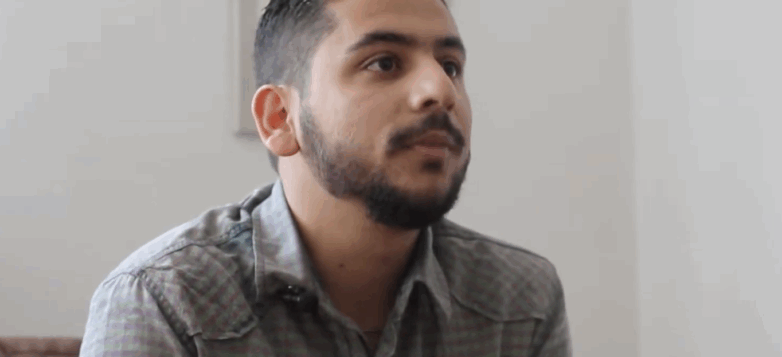Fatlum Kryeziu (1996), student, Prizren
Fatlum Kryeziu: I am Fatlum Kryeziu, I come from Prizren. I am 22 years old.
Aurela Kadriu: Okay. Do you remember the summer of 2007? It is the summer before the declaration of independence.
Fatlum Kryeziu: I don’t know, I don’t exactly remember the summer of the year you mentioned. I don’t remember the summer of 2007.
Aurela Kadriu: Do you remember when you first heard or when you first realized that Kosovo would declare independence?
Fatlum Kryeziu: Until the day when, when it was declared, I had no indicator that I could’ve known that the declaration of independence was happening. At the time I was, I don’t know, at a young age, I couldn’t understand it as I would have understood it now. I know that it was very, very noisy, I know that they were celebrating. I didn’t have any, any strong emotion about this. I did not understand what independence means, I didn’t know what it was, I just knew from others that it was good. The state of Kosovo is being created, this independence is contributing something to this society and that’s it.
Aurela Kadriu: Okay. Where, where were you on the day of the declaration of independence?
Fatlum Kryeziu: I knew the day before, I am very close to my grandmother and my uncle, we went to the airport to pick up my uncle. We didn’t know, he didn’t even know what is happening, I mean, whether the independence of Kosovo would be declared. At the time we went a day before. Usually when someone comes, it’s a tradition, when someone comes from abroad it’s a better atmosphere in the family. The way you miss them, the memories you create with them…
I was very close to him and always when he came I had, as long he stayed in Kosovo, I had a very good week. I stayed with him, he would listen to me about everything. Everything was good with his stay here. He was older and he know what independence meant. He experienced everything, like every other citizen here did. And because of his joy for the declaration of independence I was happy, too. I experienced it in the way he manifested his joy, that’s how, how I felt it, too.
Usually they wouldn’t take me when they went out, for example, the first day of the declaration of independence, or the second day of the declaration of independence. They went out to celebrate in the late hours of the night and I wanted to go, to see how they are celebrating, what are they doing, what are they drinking and just be there, but at a certain time they wouldn’t let me join them. I felt really bad and said, “It has come here, it has come here for the grown-ups…” You know, this was also very interesting for me, now that I think about it. I don’t know anything else.
Aurela Kadriu: Can you tell us what you personally did, where were you?
Fatlum Kryeziu: I don’t know. I know there was a lot of music, I know that with no… I mean, as every kid, you remembered songs, for example, those songs that we have, that we celebrate with, “Oj Kosovë, oj nëna ime” [O Kosovo, o my mother] and others. You know, and I tried to sing them, or what else. And that way I started to, to, to see.
Aurela Kadriu: Do you know, do you remember, did you watch it live when it was declared?
Fatlum Kryeziu: Yes, the recognitions, “Happy Independence day, Kosovo!” you know… Then depending on the age of the family members I would see they are closer to some different states. For example, because they are more conservative, for example, I am from Prizren and it was very important when Erdogan said, “Congratulations Kosovo!” And recently I heard something, it’s very coincidental to the, the time of the declaration of independence. For example, he said, a student from Kosovo had asked him in an interview what he thinks about Kosovo, he said that in that moment it was very beneficial for him to congratulate Kosovo on its independence before America, you know?
These are in the family, as in any other fam… Especially in Prizren, we connected to this kind of politics and they influenced me, you know, I followed everything, I was very interested, you know? With no particular awareness to understand things, or to explain the things they would say, but through their awareness I followed how they… Now, at this time I’m saying more, but even then it was interesting, you know, what sort of connections, why was it important at that time to be recognized by a state. Now that I’ve grown up I know how it is…
Aurela Kadriu: Do you remember in your family, did you discuss the independence? Do you discuss the state of Kosovo?
Fatlum Kryeziu: I lived more with my grandmother because, I mean, because of my past. I lived more with my grandmother, and she was older, she was not very interested. Any time something about politics came up, she would turn on music or she would turn on, you know, “Recetat e Cekës” [Ceka’s Recipes]. I mean, I remember everything about her. When I went home to my parents, there was more, more, I mean, there was more of a diversity of opinions because they were more, more interested and they watched news more than my grandmother. There they spoke about the independence of Kosovo, they said that it was good, there will be better employment, these were the expectations, I don’t know, there wasn’t anything else, to be honest.
Aurela Kadriu: Thank you very much.
